âI will never get tired of seeing a bulletproof black manâ âLuke Cageâsâ show runner on busting barriers
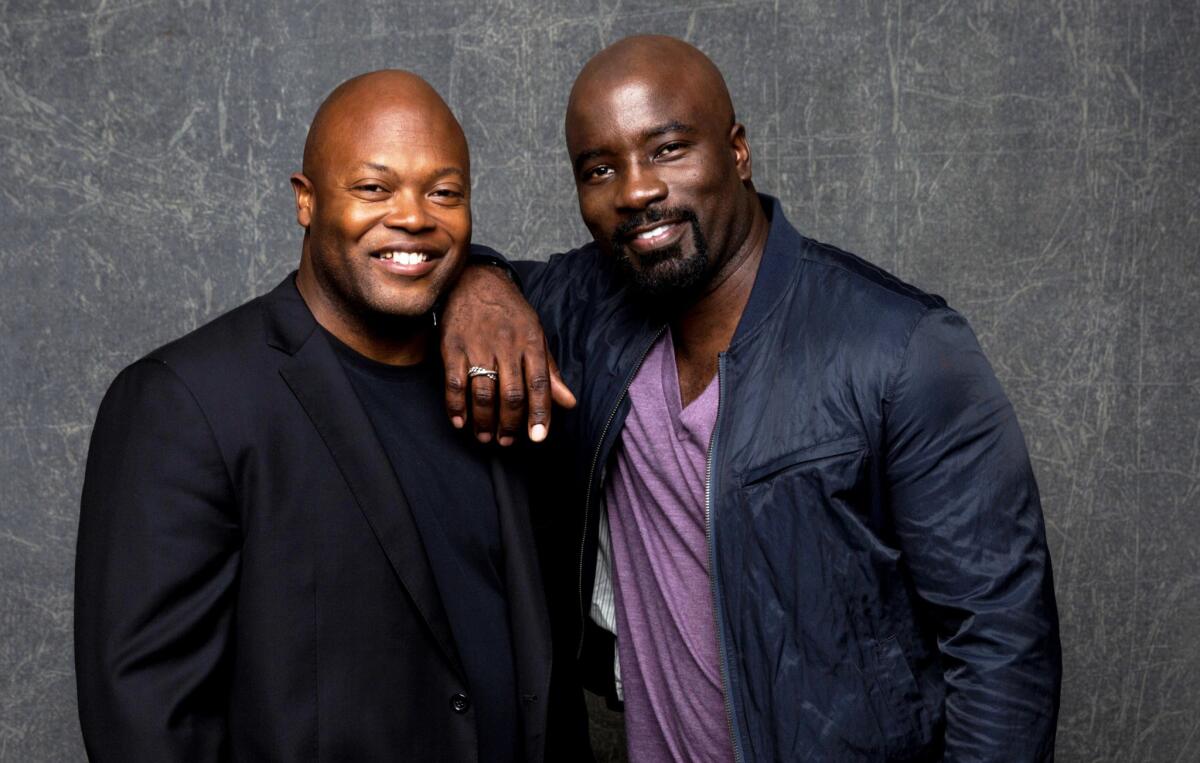
No one has to tell Cheo Hodari Coker about the ties between comic books and hip-hop. Heâs seen the connection for years.
Before Coker was producing and writing on Showtimeâs âRay Donovanâ or TNTâs âSouthland,â and certainly before he became the show runner of Netflixâs new superhero series âLuke Cage,â he was a music journalist exploring the world of hip-hop for Vibe, Rolling Stone and, for three years in the 1990s, the Los Angeles Times.
âWhen I interviewed the Notorious B.I.G., about a month before he died,â Coker said earlier this year at the Television Critics Assn. press tour, âhe told me a story about how his mother didnât know anything about his life on the street. At home he was Christopher Wallace, his motherâs son. He was âChrissy Pooh.â On the street he was Big Chris and eventually Biggie. His mother, who was a devout Jehovahâs Witness, would leave home while he was wearing one thing, but then he would go to the roof and he would change clothes.
âThatâs when he would pull out the gold rope and all the flashy stuff that his mother couldnât afford that he got from drug dealing. He put that on and would go [to school] as a different person. I likened it to the relationship between Aunt May and Peter Parker. Any time Spider-Man stuff affects Aunt May heâs horrified. Much the same way Christopher Wallace never wanted his Biggie persona to affect his mother. âŚEven as a rapper itâs about him reconciling the Peter Parker and the Spider-Man parts of his life, much how Christopher Wallace had to still be the Notorious B.I.G. and was eventually able to reconcile Christopher Wallace. Unfortunately, right as he was figuring it out, he was killed.â
See the most-read stories in Entertainment this hour Âť
Cokerâs instinctive ability to trace narrative links between superheroes and super performers should serve him well as he blends hip-hop, Harlem, literature and history into âLuke Cage,â which began streaming Friday.
âI canât turn hip-hop off just like I canât turn comic books off,â he said. âIt blends into everything for me.â

Adapted from the Marvel character created in 1972 by Archie Goodwin, John Romita Sr., and George Tuska, the new âLuke Cage,â has ditched the open yellow shirt, matching boots and bracelets from his comic book past. The âtiara,â however, does make a cameo. Mandatory comic geek Easter eggs aside, the look is pretty simple; this hero, whose powers include super strength and bulletproof skin, wears a hoodie. And yes, itâs intentional.
Cage made his first Marvel Cinematic Universe appearance in Netflixâs âJessica Jonesâ series as Jonesâ romantic counterpart. It was a role that delivered a lot of steamy, T-shirt-ripping scenes with a gender flip (it was predominantly Jones doing the ripping), but was fairly light on his back story. Now Cage is center stage in his own title series, which moved him uptown, from Hellâs Kitchen to Harlem.
âHe needed a place to go and clear his head, literally,â explained star Mike Colter, in reference to the blast he experienced in the finale of âJessica Jonesââ first season, while sitting for an interview with Coker at Comic-Con International this summer.
Cage takes up odd jobs â at barber shops sweeping hair, lifting washing machines one-handed with his superhero strength and doing dishes at the nightclub Harlemâs Paradise. No longer the flirty bartender we met in âJessica Jones,â heâs gone even deeper into hiding, avoiding all chances of a superhero showdown.
âAnd then, of course, as dramas do unfold,â Colter noted, âthereâs trouble in Harlem.â
The Harlem locale allowed Coker to further blend the worlds of music, comics and history.
âHarlem has always been the nexus of music, politics, culture, criminal figures,â Coker said. âI mean because if you look at [drug dealers] Frank Lucas and Nikki Barnes, at the same time you also have Clayton Powell and Malcolm X, you have the Cotton Club, you have Duke Ellington, Count Basie, Muhammad Ali. Every place that you walk on the streets, thereâs this history. ⌠You feel that culture and that vibe. We were able to use Harlem for Harlem.â
Perhaps in hopes of building a bit of their own history, Coker had an elaborate set constructed of a gorgeous club called Harlemâs Paradise. Itâs meant to evoke the feel of the Cotton Club and Lenox Lounge, and coincidentally works as the perfect bad guy headquarters for âLuke Cageâ villain Cornell Stokes, played by Mahershala Ali.
Itâs also a club fully booked with heaps of musical talent. Singer Raphael Saadiq appears in the pilot crooning âGood Man.â Faith Evans, Charles Bradley, the Delfonics, Method Man and Jidenna are also supposed to stop by and stir up a musical moment or two. Whatâs more, Ali Shaheed Muhammad from A Tribe Called Quest and composer Adrian Younge worked with a 30-piece orchestra on the score of âLuke Cage.â
âI would almost call it bespoke music,â Coker said. âIt is directly tailored to our story, itâs directly tailored to âLuke Cageâ the same way that âShaftâ has the Isaac Hayes sound, the same way that Curtis Mayfield is all over âSuperfly.ââ And oh yes, there will be a vinyl record released, just one more way âLuke Cageâ will connect the dots between comics and hip hop.
âIt wasnât as much about bringing the world together, as it was pointing out what was already there,â Coker said about hip-hop mixing with comic superheroes. After all, Ghostface Killahâs solo debut album was titled âIronmanâ and he sometimes refers to himself as âTony Starks.â MF Doom dons a shiny Doctor Doom-looking mask when on stage; rapper and record producer Jean Grae took her stage name from the X-Men character. The Wu-Tang Clan has their own comic series, âNine Rings of Wu-Tang,â and Marvel has been rolling out hip hop variant covers n including tributes to Biggieâs âReady to Dieâ and Spider-Man hanging out on the remade cover of A Tribe Called Questâs âMidnight Marauders.â
Beyond the music, âLuke Cageâ has already made history. This Netflix series will be Marvelâs first African American lead in a TV show or movie since the comic book company rebooted its Hollywood franchise in 2008. Both Colter and Coker are acutely aware what that means for an audience tuning in amid the current political climate.
âHeâs a bulletproof character in a world that seems to have focused on black people in a way that people were not aware of before,â Colter said. âSo how does that play to the people when theyâre watching it?â
âIn light of whatâs happening today we didnât mean to necessarily be topical, but we didnât run away from it,â Coker said. âBecause these things that are happening have been happening for a long time. The only difference now is that people have a camera crew in their pocket and they can capture these things. So weâre not shying away from the politics, weâre not shying away from the culture. But at the same time we also have a hero who is born for these times.â
And Coker is ready to defend his creation from those who would attempt to pigeonhole it as just another comic book offering.
âPeople underestimate the complexity of comic books,â he said at TCA. âYes, weâre a hardcore genre comic book show, but at the same time what makes Marvel characters different than other characters is that Marvel characters live in the real world. Itâs an alternative universe, but Luke Cage [can] also be a fan of Richard Price, George Feliciano and Walter Mosley.â
Back at Comic-con, Colter pushes the idea that the series will be uplifting. âI think thereâs an optimism about this very conscientious, thoughtful character that weâre creating,â Colter said. âIt makes you feel like there is a light at the end of the tunnel â thereâs some place that weâre going as a society and a culture, and itâs not just about Harlem. Itâs about people and how they respond. And Luke is trying to influence a community. He wants people to be their own heroes because ultimately, everything that we do is not about picking up a car and throwing it through a building, or helping someone.â
Finding the right balance between comic books and real life, though, isnât easy.
Coker recalled a discussion over a scene in which Cage would get shot a number of times. âJeph [Loeb, executive vice president of Marvel television] said, âI donât want it to come off like one of those George Reeves Superman things, like what happened when I was a kid where the guy pulls the pop gun and because the audience knows that this isnât going to affect them, thereâs no drama.â And I said, âJeph, I will never get tired of seeing a bulletproof black man.ââ
Comic-Con 2016

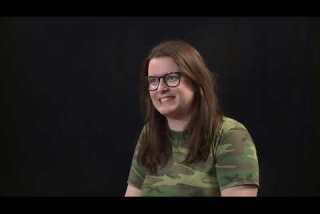
Cast of 'American Gods' drop divine secrets on the new Starz series
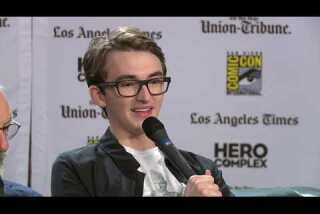
Liam Cunningham and Isaac Hempstead on finding the humor in 'Game of Thrones'
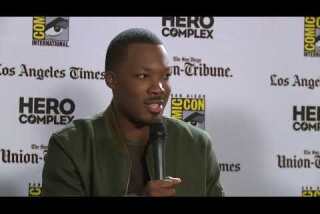
Acting opposite a giant Hollywood monster on 'Kong: Skull Island'
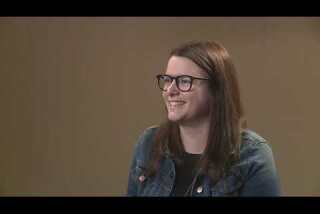
Luc Besson takes us inside his next space odyssey 'Valerian and the City of a Thousand Planets'
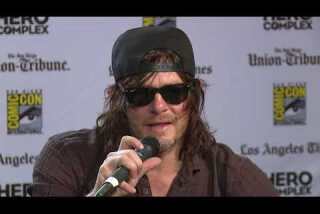
Norman Reedus on the secret Walking Dead' cast Comic-Con ritual
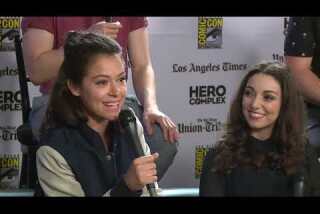
The cast of 'Orphan Black' reveal what they want to see resolved in the series finale
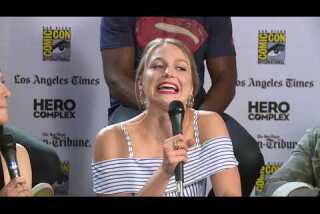
'Supergirl' cast on inspiring little girls to pick up a cape of their own
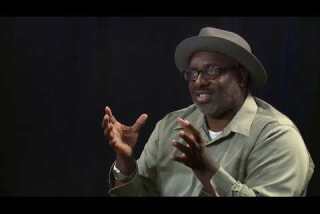
Video: Comic-Con: Wishing there could be a body swap between Fitz and Mac on 'Agents of S.H.I.E.L.D.'...
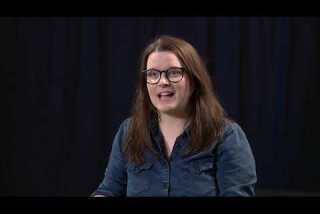
Charlie Hunnam on the hyper-stylized antics of 'King Arthur: Legend of the Sword'
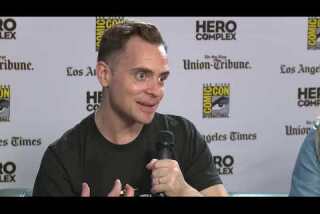
Comic-Con: Ana Gasteyer and Wyatt Cenac on 'People of Earth'
Twitter: @MdellW
ALSO
Mike Colter, Marvelâs new Luke Cage, talks about the soul of his new Netflix series
Everything we learned about âMarvelâs Luke Cageâ at the Netflix Comic-Con panel
More to Read
The biggest entertainment stories
Get our big stories about Hollywood, film, television, music, arts, culture and more right in your inbox as soon as they publish.
You may occasionally receive promotional content from the Los Angeles Times.











